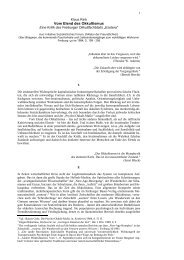Werner Bonefeld Hans-Georg Backhaus Dialektik der Wertform ... - isf
Werner Bonefeld Hans-Georg Backhaus Dialektik der Wertform ... - isf
Werner Bonefeld Hans-Georg Backhaus Dialektik der Wertform ... - isf
You also want an ePaper? Increase the reach of your titles
YUMPU automatically turns print PDFs into web optimized ePapers that Google loves.
that the dialectics of the value form holds the key for Marx’s conceptualisation<br />
of ‘money’. Not only in this chapter but throughout his book, he shows<br />
with undoubting clarity and force that an economic Marxism is a contradiction<br />
in terms.<br />
The chapter ‘On Marx’s Revolutionising and Critique of Economics:<br />
the Determination of his Object as a Totality of „perverted Forms’„ (299-333),<br />
first published in 1984, develops his concerns with Marx’s critique of economic<br />
categories on two fronts. The first concerns the critical relationship<br />
between ‘unreflected presuppositions’, on the one hand, and the issue of ‘prepositing<br />
action’ (voraussetzendes Tun), on the other. ii <strong>Backhaus</strong> charges, with<br />
Marx, that economic thought, including its sociological and philosophical offsprings,<br />
depends on assumptions that are treated as ‘givens’ and thus as untheorised<br />
presuppositions. For example, ‘capital’ is presupposed as a given<br />
and as such a given ‘used’ as a base for <strong>der</strong>iving other things such as ‘price’,<br />
value-standard, store of value etc... Such logical deductions finish up conceptually<br />
where they started: capital is capital and vice versa! In contrast, the<br />
notion of ‘prepositing action’, although not fully developed by <strong>Backhaus</strong>, asks<br />
what is capital; better: why does human purposeful social practice take the<br />
form of capital? This last points emphasises the second ‘front’ of his critique<br />
which focuses on the relationship between value ‘in itself and what Marx’s<br />
called the ‘perverted form’ of value. Value ‘in itself is, of course, the conception<br />
of value as an economic thing. The conception of value as a perverted<br />
form, in contrast, demystifies the existence of value as such a thing ‘in itself<br />
by showing its social, and therewith, human constitution. In short, following<br />
<strong>Backhaus</strong>, the value form is conceptualised as a perverted form of human<br />
practice, whose existence appears, with necessity, as a thing in-itself. This is<br />
because, as <strong>Backhaus</strong> shows, social labour is constituted in such a way that it<br />
has no consciousness of itself, a consciousness that, instead, appears to be<br />
the property of the product of human purposeful activity: the life of the commodity.<br />
His ‘Money as a Constituence or A priori of Economic Objectivation’<br />
(335-398), first published in 1986, develops his critique of’’unreflected presuppositions’<br />
through a critique of bourgeoisie conceptions of money, emphasising<br />
Marx’s conceptualisation of ‘money’ in value theoretical terms. The<br />
chapter ‘Aspects of Marx’s Category of Critique’ (399-419), first published in<br />
1989, deals with the issue of ‘perverted forms’ through an analysis of the ‘social<br />
constitution’ of economic categories. He argues convincingly that Marx’s<br />
critique of political economy shows the futility of criticising economics from<br />
within the framework, or from the standpoint of economics. For <strong>Backhaus</strong>,<br />
the destructive dimension of Marx’s critique of political economy is entailed<br />
in the ‘reduction’ of economic categories to ‘relationships between humans’<br />
and that is to social relations. <strong>Backhaus</strong> argues with compelling vigour and<br />
impressive scholarship that the separation of’constitution’ from ‘existence’<br />
constitutes the blind spot of dogmatic thought; better: vulgar thought,<br />
however critical the posture of such dogmatism.<br />
The importance of the issue of ‘social constitution’ is developed further<br />
in ‘On the Potential of Critique in Marx’s Analysis’ (421-430), first published<br />
in 1990. In this chapter, he supplies a critique of attempts that seek to<br />
determine the essence of ‘things’ on the basis of ‘immediacy’. ‘Immediacy’, of<br />
course, refers to the ‘existence’ (Dasein) of economic categories, that is their<br />
existence as things in-themselves – the raw sense-data of social existence<br />
upon which bourgeois respectfulness, be it in terms of political economy or<br />
positivist thought, rests and feeds. As a consequence, the question ‘what is<br />
„capital“‘ can not be answered: it appears either to have been installed into<br />
our social world by God’s or<strong>der</strong> or, as today’s secularised versions of the ‘invisible’,<br />
such as Critical Realism, have it, through the emergence of capital<br />
out of nature. In distinction to such perverted forms of thought. iii <strong>Backhaus</strong><br />
shows that for Marx theoretical mysteries find their rational solution in human<br />
practice and in the comprehension of this practice, however perverted<br />
this practice might be. His conception, then, of the dialectics of the value<br />
form amounts to the dialectics of ‘constitution’ and ‘existence’. The fetishism<br />
of the commodity means, then, that capitalist social relations exist necessar-<br />
2
















